中英文版白桦-船
部编版小学四年级语文下册第11课《白桦》精美课件
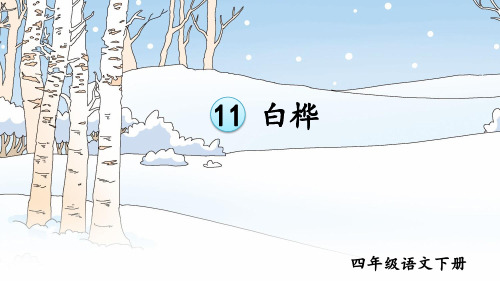
作者为什么对白桦有着这样深厚的情感? 白桦是俄罗斯的国树,诗人对白桦的
礼赞中,包含着对自然的爱,更包含着对 民族的热爱和对祖国的炽烈情感! 全班齐读。读出诗的韵味,体会诗中所传 达的炽烈的爱国情感。
拓展阅读《悬崖边的树》。
仔细读读下面的小诗,你从中读到了什 么?你有没有读懂诗人的心?
悬崖边的树 曾卓
的思想感情?下节课我们继续学习!
第三单元•第11课
白桦
第二课时
谈话导入
上节课,我们初步了解诗人叶赛宁,知道了诗中 白桦的位置和洁白之美,下面让我们一起细细品读诗 歌,看看白桦代表了什么形象,感受诗人表达的思想 感情。
赏读诗歌
读一读,选择几个词语描述这棵白桦,说说它给你 留下了怎样的印象。
洁白的流苏 灿灿的金晖 姗姗来迟的朝霞 晶亮的雪花 银色的光华 白雪皑皑的树枝
11白桦第11课时第22课时白桦林好地方海狸的家乡那里有大麋鹿自由游荡蓝色湖水岩石岸我将要再回还蓬得得蓬蓬蓬得得蓬蓬蓬得得蓬蓬蓬蓬森林的那一边遥远的平原我的心灵在呼唤北方山峦蓝色湖水岩石岸我将要再回还蓬得得蓬蓬蓬得得蓬蓬蓬得得蓬蓬蓬蓬高高的峭壁旁我搭起草房靠近那湖水边宁静安详蓝色湖水岩石岸我将要再回还蓬得得蓬蓬蓬得得蓬蓬蓬得得蓬蓬蓬蓬加拿大儿歌
小节意思
《白桦》一诗一共有4个小节。
第一节写我的窗前有一棵白桦。 第二节写了白桦在雪花中的美。
第三节写白桦在朦胧的寂静中的美。
第四节写白桦在朝霞中的美。
整体感知
读一读课文的第一小节,你对白桦树有什么了解?
在我的窗边, 有一棵白桦, 仿佛涂上银霜, 披了一身雪花。
位置 洁白
高洁、挺拔
这么美丽的白桦代表了什么形象?作者表达了怎样
茸, = (艹,指嫩芽)+
再别康桥-中英文版
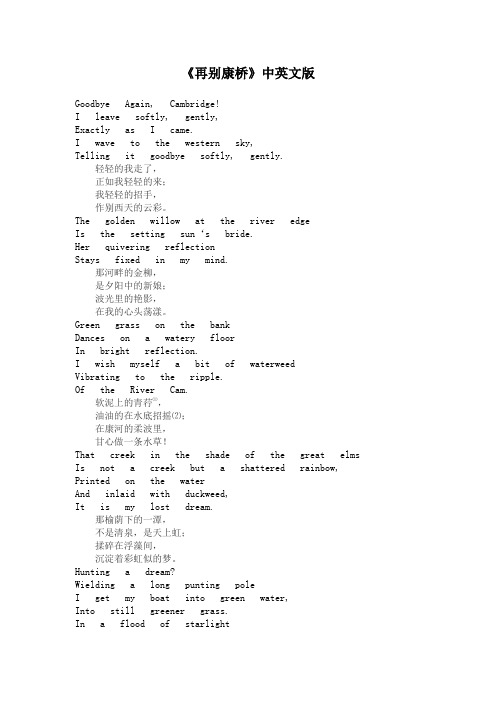
《再别康桥》中英文版Goodbye Again, Cambridge!I leave softly, gently,Exactly as I came.I wave to the western sky,Telling it goodbye softly, gently.轻轻的我走了,正如我轻轻的来;我轻轻的招手,作别西天的云彩。
The golden willow at the river edgeIs the setting sun‘s bride.Her quivering reflectionStays fixed in my mind.那河畔的金柳,是夕阳中的新娘;波光里的艳影,在我的心头荡漾。
Green grass on the bankDances on a watery floorIn bright reflection.I wish myself a bit of waterweedVibrating to the ripple.Of the River Cam.软泥上的青荇⑴,油油的在水底招摇⑵;在康河的柔波里,甘心做一条水草!That creek in the shade of the great elms Is not a creek but a shattered rainbow, Printed on the waterAnd inlaid with duckweed,It is my lost dream.那榆荫下的一潭,不是清泉,是天上虹;揉碎在浮藻间,沉淀着彩虹似的梦。
Hunting a dream?Wielding a long punting poleI get my boat into green water,Into still greener grass.In a flood of starlightOn a river of silver and diamondI sing to my heart‘s content.寻梦?撑一支长篙⑶,向青草更青处漫溯⑷;满载一船星辉,在星辉斑斓里放歌。
经典现代诗中英文翻译赏析

经典现代诗中英⽂翻译赏析经典现代诗中英⽂翻译赏析1、再别康桥《再别康桥》原是现代诗⼈徐志摩脍炙⼈⼝的诗篇,是新⽉派诗歌的代表作品。
全诗描述了⼀幅幅流动的画⾯,构成了⼀处处美妙的意境,细致⼊微地将诗⼈对康桥的爱恋,对往昔⽣活的憧憬,对眼前的⽆可奈何的离愁表现得真挚、隽永。
后被后⼈改编成同名歌曲、对联翻唱。
再别康桥轻轻的我⾛了,正如我轻轻的来;我轻轻的招⼿,作别西天的云彩。
那河畔的⾦柳,是⼣阳中的新娘;波光⾥的艳影,在我的⼼头荡漾。
软泥上的青荇,油油的在⽔底招摇;在康河的柔波⾥,我⽢⼼做⼀条⽔草。
那榆阴下的⼀潭,不是清泉,是天上虹;揉碎在浮藻间,沉淀着彩虹似的梦。
寻梦?撑⼀⽀长篙,向青草更青处漫溯;满载⼀船星辉,在星辉斑斓⾥放歌。
但我不能放歌,悄悄是别离的笙箫;夏⾍也为我沉默,沉默是今晚的康桥!悄悄的我⾛了,正如我悄悄的来;我挥⼀挥⾐袖,不带⾛⼀⽚云彩。
编辑本段诗歌译⽂英语译⽂译诗1:Very quietly I take my leaveAs quietly as I came here;Quietly I wave good-byeTo the rosy clouds in the western sky.The golden willows by the riversideAre young brides in the setting sun;Their reflections on the shimmering wavesAlways linger in the depth of my heart.The floating heart growing the sludgeSways leisurely under the water;In the gentle waves of CambridgeI would be a water plant!That pool under the shade of elm treesHolds not water but the rainbow from the sky;Shattered to pieces among the duck weedsIs the sediment of a rainbow-like dream?To seek a dream?Just to pole a boat upstreamTo where the green grass is more verdantOr to have the boat fully loaded with starlight And sing aloud in the splendor of starlight. But I can’t sing al oudQuietness is my farewell music;Even summer insects heap silence for meSilent is Cambridge tonight!Very quietly I leftAs quietly as I came here;Gently I flick my sleevesNot even a wisp of cloud will I bring away译诗2:Goodbye Again, Cambridge!I leave softly, gently,Exactly as I came.I wave to the western sky,Telling it goodbye softly, gently.The golden willow at the river edgeIs the setting sun‘s bride.Her quivering reflectionStays fixed in my mind.Green grass on the bankDances on a watery floorIn bright reflection.I wish myself a bit of waterweedVibrating to the ripple.Of the River Cam.That creek in the shade of the great elms Is not a creek but a shattered rainbow, Printed on the waterAnd inlaid with duckweed,It is my lost dream.Hunting a dream?Wielding a long punting poleI get my boat into green water,Into still greener grass.In a flood of starlightOn a river of silver and diamondI sing to my heart‘s content.But now, no, I cannot singWith farewell in my heart.Farewells must be quiet, mute,Even the summer insects are silent,Knowing I am leaving.The Cambridge night is soundless.I leave quietlyAs I came quietly.I am leavingWithout taking so muchAs a piece of cloud.But with a quick jerk of my sleaveI wave goodbye.2、乡愁乡愁作者:余光中(poet)原⽂:(中⽂)惆怅的乡愁(7张)⼩时候,乡愁是⼀枚⼩⼩的邮票,我在这头,母亲在那头。
部编版四年级语文下册第11课《白桦》精美课件【最新】

第1课时 第2课时
新课新导课入导入
第1课时
你们认识这种树吗?说说它的特点。
语文百宝箱
白桦:亦称“桦木”“粉桦”。桦木科,落 叶乔木。树干端直,树皮灰白色,纸状,分层脱 落。分布于中国大兴安岭、 小兴安岭、长白山及华北、 西北、西南,亦见于朝鲜 半岛、日本北部和俄罗斯 西伯利亚东部。
作者简介
姗姗来迟 欣欣向荣 彬彬有礼 亭亭玉立 依依不舍 孜孜不倦 奄奄一息 蒸蒸日上 斤斤计较 津津有味 念念不忘 滔滔不绝
课后习题参考答案
有感情地朗读课文。 朗读指导:朗读第1小节要亲切、自
然,体现出对朝夕相处的白桦的喜爱。朗 读第2小节,语调欢快,读出赞美的语气。 朗读第3小节,语速稍慢,略显深沉,体 现出一种崇敬之情。朗读第4小节,语调 上扬,读出尊敬、赞美的热情。
——[唐]王勃《春庄》
课后作业
1. 你还从哪些事物中感受到了美好的品 质?和同学分享交流。
2. 假期去公园或植物园仔细观察白桦树, 联系课文体会诗中的情感。
11 白桦
满身的雪花、雪绣的花边、洁白的流 苏……这就是诗人叶赛宁笔下的白桦。今天, 让我们跟随诗人的吟诵,来学习这首现代诗。
叶赛宁(1895-1925), 俄罗斯田园派代表诗人, 1914年发表抒情诗《白桦》, 短短30年的人生,曾多次描 绘并赞美白桦。
在我的窗前, 素白光滑, 有一棵白桦, 质感、色
仿佛涂上银霜, 泽独特
披了一身雪花。富有光泽
少女 仙女
如果把白桦 看成人,你觉得
是什么人?
朗读指导 窗前少女亭亭玉立,鲜活生动,带着你的 感受再次朗读第一小节。
在我的窗前, 有一棵白桦, 仿佛涂上银霜, 披了一身雪花。
毛茸茸的枝头, 雪绣的花边潇洒, 串串花穗齐绽, 洁白的流苏如画。
Birches白桦林
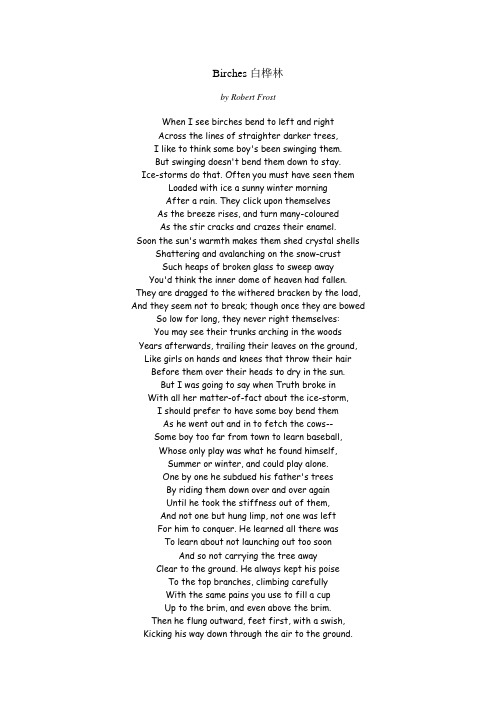
Birches白桦林by Robert FrostWhen I see birches bend to left and rightAcross the lines of straighter darker trees,I like to think some boy's been swinging them.But swinging doesn't bend them down to stay.Ice-storms do that. Often you must have seen them Loaded with ice a sunny winter morningAfter a rain. They click upon themselvesAs the breeze rises, and turn many-colouredAs the stir cracks and crazes their enamel. Soon the sun's warmth makes them shed crystal shells Shattering and avalanching on the snow-crustSuch heaps of broken glass to sweep away You'd think the inner dome of heaven had fallen. They are dragged to the withered bracken by the load, And they seem not to break; though once they are bowed So low for long, they never right themselves:You may see their trunks arching in the woods Years afterwards, trailing their leaves on the ground, Like girls on hands and knees that throw their hairBefore them over their heads to dry in the sun.But I was going to say when Truth broke in With all her matter-of-fact about the ice-storm,I should prefer to have some boy bend themAs he went out and in to fetch the cows--Some boy too far from town to learn baseball,Whose only play was what he found himself,Summer or winter, and could play alone.One by one he subdued his father's treesBy riding them down over and over againUntil he took the stiffness out of them,And not one but hung limp, not one was leftFor him to conquer. He learned all there wasTo learn about not launching out too soonAnd so not carrying the tree awayClear to the ground. He always kept his poiseTo the top branches, climbing carefullyWith the same pains you use to fill a cupUp to the brim, and even above the brim.Then he flung outward, feet first, with a swish, Kicking his way down through the air to the ground.So was I once myself a swinger of birches.And so I dream of going back to be.It's when I'm weary of considerations,And life is too much like a pathless wood Where your face burns and tickles with the cobwebs Broken across it, and one eye is weepingFrom a twig's having lashed across it open.I'd like to get away from earth awhileAnd then come back to it and begin over.May no fate wilfully misunderstand meAnd half grant what I wish and snatch me away Not to return. Earth's the right place for love:I don't know where it's likely to go better.I'd like to go by climbing a birch tree~And climb black branches up a snow-white trunk Toward heaven, till the tree could bear no more, But dipped its top and set me down again. That would be good both going and coming back. One could do worse than be a swinger of birches.白桦树弯曲,或左或右:每当我看见白桦树穿过又直又黑的树木,我都会想,是个小男孩在荡它们。
ships in the desert课文翻译

ships in the desert课文翻译Unit 3 - Ships In The DesertShips In The DesertI was standing in the sun on the hot steel deck of a fishing ship capable of processing a fifty-ton catch on a good day. But it wasn't a good day.We were anchored in what used to be the most productive fishing site in all of central Asia, but as I looked out over the bow, the prospects of a good catch looked bleak.Where there should have been gentle blue-green waves lapping against the side of the ship, there was nothing but hot dry sand-as far as I could see in all directions.The other ships of the fleet were also at rest in the sand, scattered in the dunes that stretched all the way to the horizon.Ten years ago the Aral was the fourth largest inland sea in the world, comparable to the largest of North America's Great Lakes.Now it is disappearing because the water that used to feed it has been diverted in an ill-considered irrigation scheme to grow cotton in the desert.The new shoreline was almost forty kilometers across, the sand from where the fishing fleet was now permanently docked.Meanwhile, in the nearby town of Muynak the people were still canning fish -brought not from the Aral Sea but shipped by rail through Siberia from the Pacific Ocean, more than a thousand miles away.My search for the underlying causes of the environmental crisis has led me to travel around the world to examine and study many of these images of destruction.At the very bottom of the earth, high in the Trans-Antarctic Mountains, with the sun glaring at midnight through a hole in the sky, I stood in the unbelievable coldness and talked with a scientist in the late fall of 1988 about the tunnel he was digging through time.Slipping his parka back to reveal a badly burned face that was cracked and peeling, he pointed to the annual layers of ice in a core sample dug from the glacier on which we were standing.He moved his finger back in time to the ice of two decades ago. "Here's where the U.S. Congress passed the Clean Air Act," he said.At the bottom of the world, two continents away from Washington, D. C., even a small reduction in one country's emissions had changed the amount of pollution found in the remotest and least accessible place on earth.But the most significant change thus far in the earth's atmosphere is the one that began with the industrial revolution early in the last century and has picked up speed ever since.Industry meant coal, and later oil, and we began to burn lots of it-bringing rising levels of carbon dioxide (CO2), with its ability to trap more heat in the atmosphere and slowly warm the earth.Fewer than a hundred yards from the South Pole, upwind from the ice runway where the ski plane lands and keeps its engines running to prevent the metal parts from freeze-locking together, scientists monitor the air several times every day to chart the course of that inexorable change.During my visit, I watched one scientist draw the results of that day's measurements, pushing the end of a steep line still higher on the graph.He told me how easy it is-there at the end of the earth-to see that this enormous change in the global atmosphere is still picking up speed.Two and a half years later I slept under the midnight sun at the other end of our planet, in a small tent pitched on atwelve-foot-thick slab of ice floating in the frigid Arctic Ocean.After a hearty breakfast, my companions and I traveled by snowmobiles a few miles farther north to a rendezvous point wherethe ice was thinner -only three and a half feet thick-and a nuclear submarine hovered in the water below.After it crashed through the ice, took on its new passengers, and resubmerged, I talked with scientists who were trying to measure more accurately the thickness of the polar ice cap, which many believe is thinning as a result of global warming.I had just negotiated an agreement between ice scientists and the U. S. Navy to secure the release of previously top secret data from submarine sonar tracks, data that could help them learn what is happening to the north polar cap.Now, I wanted to see the pole itself, and some eight hours after we met the submarine, we were crashing through that ice, surfacing, and then I was standing in an eerily beautiful snowscape, windswept and sparkling white, with the horizon defined by little hummocks, or "pressure ridges" of ice that are pushed up like tiny mountain ranges when separate sheets collide.But here too, CO2 levels are rising just as rapidly, and ultimately temperature will rise with them-indeed, global warming is expected to push temperatures up much more rapidly in the polar regions than in the rest of the world.As the polar air warms, the ice here will thin; and since then, polar cap plays such a crucial role in the world's weather system, the consequences of a thinning cap could be disastrous.Considering such scenarios is not a purely speculative exercise.Six months after I returned from the North Pole, a team of scientists reported dramatic changes in the pattern of ice distribution in the Arctic, and a second team reported a still controversial claim (which a variety of data now suggest) that, overall, the north polar cap has thinned by 2 percent in just the last decade.Moreover, scientists established several years ago that in many land areas north of the Arctic Circle, the spring snowmelt now comes earlier every year, and deep in the tundra below, the temperature of the earth is steadily rising.As it happens, some of the most disturbing images of environmental destruction can be found exactly halfway between the North and South poles -precisely at the equator in Brazil-where billowing clouds of smoke regularly blacken the sky above the immense but now threatened Amazon rain forest.Acre by acre, the rain forest is being burned to create fast pasture for fast-food beef; as I learned when I went there in early 1989, the fires are set earlier and earlier in the dry season now,with more than one Tennessee's worth of rain forest being slashed and burned each year.According to our guide, the biologist Tom Lovejoy, there are more different species of birds in each square mile of the Amazon than exist in all of North America-which means we are silencing thousands of songs we have never even heard.But one doesn't have to travel around the world to witness humankind's assault on the earth. Images that signal the distress of our global environment are now commonly seen almost anywhere.On some nights, in high northern latitudes, the sky itself offers another ghostly image that signals the loss of ecological balance now in progress.If the sky is clear after sunset-and if you are watching from a place where pollution hasn't blotted out the night sky altogether-you can sometimes see a strange kind of cloud high in the sky.This "noctilucent cloud" occasionally appears when the earth is first cloaked in the evening darkness; shimmering above us with a translucent whiteness, these clouds seem quite unnatural: And they should:noctilucent clouds have begun to appear more often because of a huge buildup of methane gas in the atmosphere.Also called natural gas, methane is released from landfills, from coal mines and rice paddies, from billions of termites that swarm through the freshly cut forestland, from the burning of biomass and from a variety of other human activities.Even though noctilucent clouds were sometimes seen in the past, all this extra methane carries more water vapor into the upper atmosphere, where it condenses at much higher altitudes to form more clouds that the sun's rays still strike long after sunset has brought the beginning of night to the surface far beneath them.What should we feel toward these ghosts in the sky? Simple wonder or the mix of emotions we feel at the zoo?Perhaps we should feel awe for our own power: just as men tear tusks from elephants' heads in such quantity as to threaten the beast with extinction, we are ripping matter from its place in the earth in such volume as to upset the balance between daylight and darkness.In the process, we are once again adding to the threat of global warming, because methane has been one of the fastest-growing greenhouse gases, and is third only to carbon dioxide and water vapor in total volume, changing the chemistry of the upper atmosphere.But, without even considering that threat, shouldn't it startle us that we have now put these clouds in the evening sky which glisten with a spectral light?Or have our eyes adjusted so completely to the bright lights of civilization that we can't see these clouds for what they are-a physical manifestation of the violent collision between human civilization and the earth?Even though it is sometimes hard to see their meaning, we have by now all witnessed surprising experiences that signal the damage from our assault on the environment-whether it's the new frequency of days when the temperature exceeds 100 degrees, the new speed with which the sun burns our skin, or the new constancy of public debate over what to do with growing mountains of waste.But our response to these signals is puzzling. Why haven't we launched a massive effort to save our environment?To come at the question another way: Why do some images startle us into immediate action and focus our attention on ways to respond effectively?And why do other images, though sometimes equally dramatic, produce instead a kind of paralysis, focusing our attention not on ways to respond but rather on some convenient, less painful distraction?Still, there are so many distressing images of environmental destruction that sometimes it seems impossible to know how to absorb or comprehend them.Before considering the threats themselves, it may be helpful to classify them and thus begin to organize our thoughts and feelings so that we may be able to respond appropriately.A useful system comes from the military, which frequently places a conflict in one of three different categories, according to the theater in which it takes place.There are "local" skirmishes, “regional" battles, and "strategic" conflicts. This third category is reserved for struggles that can threaten a nation's survival and must be understood in a global context.Environmental threats can be considered in the same way. For example, most instances of water pollution, air pollution, and illegal waste dumping are essentially local in nature.Problems like acid rain, the contamination of underground aquifers, and large oil spills are fundamentally regional.In both of these categories, there may be so many similar instances of particular local and regional problems occurring simultaneously all over the world that the pattern appears to be global, but the problems themselves are still not truly strategicbecause the operation of the global environment is not affected and the survival of civilization is not at stake.However, a new class of environmental problems does affect the global ecological system, and these threats are fundamentally strategic.The 600 percent increase in the amount of chlorine in the atmosphere during the last forty years has taken place not just in those countries producing the chlorofluorocarbons responsible but in the air above every country, above Antarctica, above the North Pole and the Pacific Ocean-all the way from the surface of the earth to the top of the sky.参考译文——沙漠中的捕鱼船队沙漠中的捕鱼船队我在阳光中站在一艘渔轮的灼热的钢甲板上。
经典的英文诗歌带翻译

经典的英文诗歌带翻译俄国意象派是俄国现代主义诗歌的四大流派之一,在俄国文学史上占有一席之地。
下面小编整理了经典的英文诗歌带翻译,希望大家喜欢!经典的英文诗歌带翻译摘抄LighthouseRiverbank silent in winter evening, few staysI read my homestead alone in my dreamlandA hand raised suddenly, touches the heaven:A beam of light radiating from you, lighthouse!Thrusting in the dark, the light is flown with dustBrightening river route and winged insectsSoon encompassing all and pacifying the soulA bit burdened is my eternal thinkingBy the side of peaceful routeThere berth a fleet of ships at half-mastThey stand as furious skeletonsIndifferent to your bright sightThey have reached a destination for businessSubmerged in currents of people, in a cyclic dangerI have no way to climb within the surging waterMy arm does nothing other than signal:“Over here, lighthouse, can you yet see me?”So elated for me to see you, my lighthouseSuch extravagance to touch your light yetAnother fantastic wish is to be held in your bosomEnlightening the internal darkness, yours and mine!——Published on Anthology of the XXII World Congress of Poets(2002,Romania)灯塔冬夜的江岸无声,少有人外出我独自在梦境阅读家园蓦然抬手触及天堂,即:一束光明源自你,灯塔!刺破夜色的光,因尘埃而飞翔遮住整个航道及飞虫即刻包容万象,抚慰心灵恒远的思虑略显沉重宁静的航线一侧停着一条收帆的船队,桅杆犹如激情燃尽的残骸无暇顾及你的视线它们已到达商业,抵达目的地我淹没在人流中,险象环生奔腾的流水无处可攀手臂只想努力挥动:“灯塔,在这,能看见吗?”我能看见你,灯塔,如此的幸福触摸你的光芒更是一种奢华而另一种奢望,便是进入内部点燃内心的黑暗,你我的自身!经典的英文诗歌带翻译鉴赏upposeSuppose birds should fly in now,But they are not yet seen.Why is the wood so patiently keen?In the North Mountain there is a net.Maybe it is stretched, isn't it yet?①Suppose it is already gloomy in my hometown,And there comes rain drops shooting at people.My country folk that are running in the rainAre still thinking about the sunny days in the future?Suppose the rooster is itching to crow,But it keeps silent.The timid children would go panic.Mom, has the weasel come?Suppose Spring has learn to cheat,Then the earth would say: this is not spring.The hoe would go rusty,The exploiter would carry away his prophesy of harvest.At dawn of May 21, 1979 When Kunming was still covered by the night curtain.Note: ancient ballad:There is a bird in South Mountainand inthe North Mountain a net isstretched open. The bird flies high and the net remains idle.假如作者:公刘假如小鸟应该飞来,偏偏却不见它飞来,树林为甚么还耐心等待?北山有罗,也许已经张开?①假如我的家乡天色阴暗,而且射来了砸人的雨点,我那雨中奔跑的乡亲哟,是否你在默想未来的晴天?假如雄鸡渴望歌唱,却又偏偏噤声不响,胆怯的孩子就难免惊慌:妈妈,是不是来了黄鼠狼?假如春天也学会了欺骗,那么大地就会说:这不是真的春天;锄头将生锈,拓荒者将带走收获的预言。
四年级下册语文《白桦》知识点大全

四年级下册语文《白桦》知识点大全《白桦》于1914年发表。
这首诗意象鲜明、节律和谐、感情欢悦、意境明丽,是一首优美的抒情诗。
你会整理有关四年级下册语文《白桦》的知识点吗?亲爱的读者,下面给大家分享关于四年级下册语文《白桦》知识点,欢迎阅读!四年级下册语文《白桦》原文在我的窗前,有一棵白桦,仿佛涂上银霜,披了一身雪花。
毛茸茸的枝头,雪绣的花边潇洒,串串花穗齐绽,洁白的流苏如画。
在朦胧的寂静中玉立着这棵白桦,在灿灿的金晖里闪着晶亮的雪花。
白桦四周徜徉着姗姗来迟的朝霞,它向白雪皑皑的树枝又抹一层银色的光华。
__________本诗作者是苏联的叶赛宁,译者顾蕴璞。
四年级下册语文《白桦》知识点我会写:桦:白桦黑桦红桦桦树涂:涂色涂抹涂改涂鸦生灵涂炭茸:茸毛鹿茸毛茸茸绿茸茸绣:绣花绣字刺绣锦绣苏绣湘绣潇:潇洒风雨潇潇穗:花穗麦穗谷穗穗子高粱穗朦:朦胧胧:朦胧寂:寂静寂寞寂寥沉寂寂然无声霞:朝霞晚霞云霞彩霞霞光抹:涂抹抹零抹杀抹黑抹眼泪生字视频形近字:桦(桦树)哗(喧哗) 涂(涂色)途(路途)绣(绣花)秀(秀丽) 潇(潇洒)萧(萧条)胧(朦胧)拢(聚拢) 抹(涂抹)沫(泡沫)多音字:佛:fú仿佛fó佛像抹:mǒ抹杀mò转弯抹角mā抹布近义词:仿佛——好像朦胧——模糊寂静——安静徜徉——徘徊反义词:洁白——乌黑朦胧——清晰寂静——喧闹理解词语:没有声音;很静。
闲游;安闲自在地步行。
【姗姗来迟】形容来得很晚。
(神情、举止、风貌等)自然大方,有韵致,不拘束。
装在车马、楼台、帐幕、锦旗等上面的穗状饰物。
一同绽放。
形容霜、雪洁白。
段落大意:第一部分(1~2):写白桦的外在形象美。
第二部分(3~4):写白桦的内在气质美。
课文主题:诗歌以白桦为中心意象,从不同角度描写出了它的美。
白桦那么高洁挺拔,它是高尚人格的象征。
诗歌字里行间充溢着对白杨由衷的喜爱、赞美和崇敬之情,体现了诗人对拥有白桦品质的人的尊敬以及对家乡和大自然的热爱之情。
白桦林好地方英文版
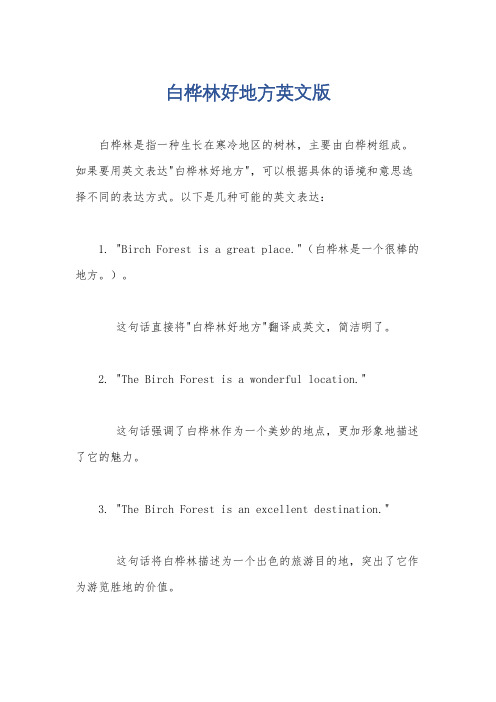
白桦林好地方英文版
白桦林是指一种生长在寒冷地区的树林,主要由白桦树组成。
如果要用英文表达"白桦林好地方",可以根据具体的语境和意思选择不同的表达方式。
以下是几种可能的英文表达:
1. "Birch Forest is a great place."(白桦林是一个很棒的地方。
)。
这句话直接将"白桦林好地方"翻译成英文,简洁明了。
2. "The Birch Forest is a wonderful location."
这句话强调了白桦林作为一个美妙的地点,更加形象地描述了它的魅力。
3. "The Birch Forest is an excellent destination."
这句话将白桦林描述为一个出色的旅游目的地,突出了它作为游览胜地的价值。
4. "The Birch Forest is a fantastic spot."
这句话使用了"spot"表示地点,同时用"fantastic"形容白桦林,传达了它的美妙之处。
总之,根据具体的语境和表达意图,可以选择不同的英文表达方式来描述"白桦林好地方"。
《桦皮船》读后感
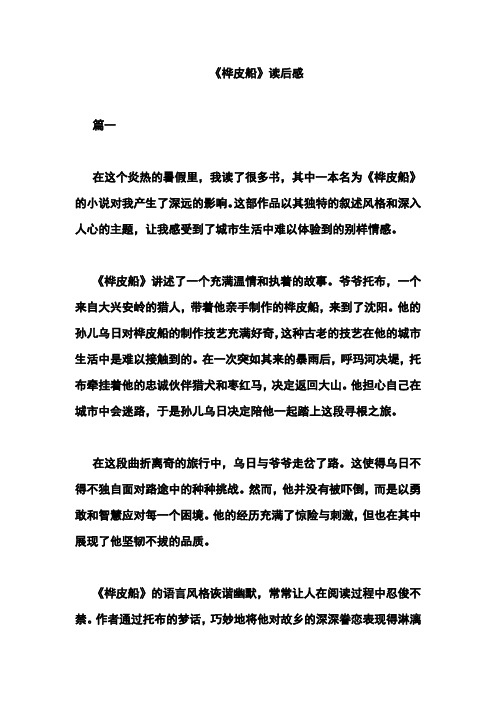
《桦皮船》读后感篇一在这个炎热的暑假里,我读了很多书,其中一本名为《桦皮船》的小说对我产生了深远的影响。
这部作品以其独特的叙述风格和深入人心的主题,让我感受到了城市生活中难以体验到的别样情感。
《桦皮船》讲述了一个充满温情和执着的故事。
爷爷托布,一个来自大兴安岭的猎人,带着他亲手制作的桦皮船,来到了沈阳。
他的孙儿乌日对桦皮船的制作技艺充满好奇,这种古老的技艺在他的城市生活中是难以接触到的。
在一次突如其来的暴雨后,呼玛河决堤,托布牵挂着他的忠诚伙伴猎犬和枣红马,决定返回大山。
他担心自己在城市中会迷路,于是孙儿乌日决定陪他一起踏上这段寻根之旅。
在这段曲折离奇的旅行中,乌日与爷爷走岔了路。
这使得乌日不得不独自面对路途中的种种挑战。
然而,他并没有被吓倒,而是以勇敢和智慧应对每一个困境。
他的经历充满了惊险与刺激,但也在其中展现了他坚韧不拔的品质。
《桦皮船》的语言风格诙谐幽默,常常让人在阅读过程中忍俊不禁。
作者通过托布的梦话,巧妙地将他对故乡的深深眷恋表现得淋漓尽致。
这种独特的写作手法不仅让读者在阅读时感到愉悦,还能让他们深刻地感受到爷爷对故乡的热爱和怀念。
作为一个在城市长大的孩子,我深感自己与故乡的联系越来越疏远。
读完这本书后,我更加珍惜与家乡的联系,也更加理解了那些坚守在自己土地上的人们。
书中的角色形象鲜明且立体,每个人物都有其独特的性格和特点。
托布的执着与热爱让我深深地感动。
他对非物质文化遗产桦皮船的坚守让我思考起了自己的责任与担当。
同时,他对忠诚伙伴猎犬和枣红马的牵挂也让我感受到了人与动物之间深厚的情感纽带。
退休返乡的骗子李阿哈在初看时让人心生警惕,但随着故事的推进,我们逐渐看到了他善良的一面。
他的转变让我们明白,每个人都有改过自新、重新做人的机会。
而乌日的勇敢、冷静、善良和孝顺则是我学习的榜样。
他的经历让我明白,在面对困难和挑战时,只有坚定的信念和勇敢的行动才能引领我们走向成功。
此外,《桦皮船》还让我领略了大自然的壮美与惊奇。
人教版二年级语文上册第二单元练习真题及答案

第二单元综合测试(满分:100分时间:60分钟得分:)一.给加点字选择正确的读音,打“√”。
(6分)雄.鹰展翅(xóng xióng) 一艘.船(sōu shōu)酸.酸甜甜(shuān suān) 白桦.树(huá huà)一场.雨(cháng chǎng) 了.不起(le liǎo)二.看拼音,写词语。
(9分) xīn kǔ1.2020年年初以来,全国上下抗击新冠疫情。
钟南山院士 ,máng qún ài dài碌在抗疫第一线,受到人民 众的 。
yuàn sōng bǎi2. 子里种着四季常青的 。
三.根据拼音写同音字。
(12分)( )边 大( ) ( )树 shēn fēng yáng( )情 ( )叶 太( )( )学 草( ) ( )好 tóng cóng yǒu+梧( ) ( )前 没( ) 四.我会查字典。
(6分)五.按要求连一连。
(8分)野鸭 黄鹂 孔雀 大雁含“隹”的动物 含“鸟”的动物麻雀 锦鸡 金丝雀 乌鸦六.词语跷跷板。
(15分)1.选词填空。
(填序号)(4分)①笑盈盈 ②绿油油 ③喜洋洋 ④黄澄澄(1)身体虽然辛苦,心里( )。
(2)春天,( )的麦苗儿一眼望不到边。
(3)天上的月亮( )地望着我们。
(4)秋天,稻子熟了,( )的,像铺了一地金子。
2.选一选,填一填。
(11分)①除 ②打 ③耕 ④施 ⑤割( )田 ( )麦 ( )肥 ( )草 ( )谷 (1) 上面的词语都是描写四季农事活动的,我还知道夏季的农事活动:秋天到)。
参考答案:一. xióng sōu suān huà cháng liǎo二.1.季 辛苦 忙 群 爱戴2.院 松柏三.身 深 风 枫 杨 杨 阳 同 桐 丛 从 友 有四. S 又 八 示例:桑树M 犭 八 示例:凶猛Y 钅 六 示例:银子五.含“隹”的动物:孔雀 大雁 麻雀 金丝雀 含“鸟”的动物:野鸭 黄鹂 锦鸡 乌鸦六.1.(1.)③ (2)② (3)① (4)④2.③ ⑤ ④ ① ②(1)示例:采桑 插秧(2)戴 学 吹 采七.示例:1.秋天,树上的苹果像一张张笑脸。
泊船瓜洲 英文版

泊船瓜洲英文版The Poem of the Moored Boat in GuazhouAs the sun dipped below the horizon, casting a warm glow over the tranquil waters, I found myself drawn to the serene shores of Guazhou. The gentle lapping of the waves against the riverbank and the rustling of the willows lent a sense of timeless serenity to the scene. It was in this idyllic setting that I happened upon a solitary boat, its hull gently rocking on the current, as if inviting me to step aboard and drift away from the cares of the world.As I approached the moored vessel, I couldn't help but be captivated by its weathered, yet sturdy appearance. The wood had been polished by the elements, giving it a warm, burnished hue that spoke of the boat's long and storied history. The oars, worn smooth by countless dips into the water, seemed to whisper tales of past voyages, of adventures and discoveries that had once unfolded upon this very vessel.Stepping onto the boat, I felt a sense of connection to the past, as if I had been transported to a bygone era when life moved at a slower, more contemplative pace. The gentle rocking of the boat, coupledwith the soothing sounds of nature, lulled me into a state of tranquility, and I found myself drawn to the poetry that seemed to emanate from the very essence of this humble craft.As I settled into the boat, I couldn't help but reflect on the significance of this place, Guazhou, and its enduring legacy. For centuries, this small stretch of riverbank had borne witness to the ebb and flow of human activity, from the bustling commerce of bygone days to the more contemplative moments of solitude and reflection that now filled the air.It was in this moment that I felt a profound sense of appreciation for the timeless beauty of this place, and the role that the humble boat played in preserving its enduring spirit. The boat, with its weathered hull and steadfast presence, served as a tangible link to the past, a testament to the enduring human desire to explore, to discover, and to find solace in the natural world.As I gazed out over the gently rippling waters, I couldn't help but imagine the countless stories that had unfolded upon this very boat, the tales of traders and adventurers, of poets and philosophers, who had all found refuge and inspiration in its humble embrace. Each scratch, each worn plank, seemed to whisper the echoes of those who had come before, inviting me to add my own chapter to the ongoing saga of this remarkable place.In that moment, I felt a deep connection to the history and legacy of Guazhou, a sense of being part of a timeless tradition that stretched back through the centuries. The boat, with its silent, steadfast presence, became a symbol of that enduring spirit, a reminder that even in the midst of a rapidly changing world, there are still places where the rhythms of life remain unchanged, where the simple pleasures of being on the water can transport us to a realm of tranquility and contemplation.As I reluctantly bid farewell to the moored boat and the enchanting shores of Guazhou, I carried with me a renewed sense of appreciation for the enduring beauty of this place. The experience had left an indelible mark on my soul, a reminder that sometimes the most profound moments of discovery and inspiration can be found in the most humble and unassuming of places. And so, with a heart full of gratitude and a mind brimming with the echoes of the past, I set out to share the story of the Moored Boat in Guazhou, a testament to the timeless power of the natural world to captivate, inspire, and transform us all.。
桦皮船读书卡内容

桦皮船读书卡内容【原创版4篇】篇1 目录1.桦皮船读书卡的背景和意义2.桦皮船读书卡的内容和特点3.桦皮船读书卡的使用和推广4.桦皮船读书卡对阅读的促进作用篇1正文桦皮船读书卡是一种鼓励阅读的工具,它的出现旨在激发人们的阅读兴趣,提高阅读能力,推广阅读文化。
作为一种新型的阅读方式,桦皮船读书卡在当今社会中受到了广泛的关注和欢迎。
桦皮船读书卡的内容和特点主要体现在它的设计理念和功能上。
首先,桦皮船读书卡以阅读为主题,鼓励人们通过阅读来获取知识和提高自我。
其次,桦皮船读书卡具有趣味性和实用性,它可以让读者在阅读的过程中感受到乐趣和成就感。
此外,桦皮船读书卡还具有灵活性和多样性,它可以根据读者的不同需求和兴趣来提供不同的阅读内容和方式。
在使用和推广方面,桦皮船读书卡也具有很大的优势。
它不仅可以在传统的纸质媒介上使用,还可以在电子设备和网络上使用。
这使得桦皮船读书卡更加方便和快捷,能够满足现代人快节奏的生活方式。
同时,桦皮船读书卡还具有社交功能,可以让读者在阅读的过程中分享心得和交流思想,从而更好地享受阅读的乐趣。
总的来说,桦皮船读书卡对阅读的促进作用是不容忽视的。
它不仅可以帮助人们养成良好的阅读习惯,还可以提高人们的阅读效率和质量。
篇2 目录1.桦皮船读书卡的背景和意义2.桦皮船读书卡的内容概述3.桦皮船读书卡的具体内容4.桦皮船读书卡的使用建议篇2正文桦皮船读书卡是一种特殊的读书卡片,它的背景和意义源于我国古代的一种传统阅读方式。
在古代,人们常常将读书的心得和感悟记录在桦皮船上,以此来表达对阅读的热爱和对知识的追求。
如今,桦皮船读书卡作为一种文化传承,仍然在人们的阅读生活中扮演着重要的角色。
桦皮船读书卡的内容概述主要包括阅读书目、阅读时间、阅读感悟等方面。
这种卡片可以帮助读者系统地记录自己的阅读过程,从而提高阅读效率和质量。
同时,它也可以作为一种阅读交流的方式,让读者在分享阅读心得的过程中,相互学习、共同进步。
一首英文诗,被翻译为七个版本的中文诗,简直美翻了!

一首英文诗,被翻译为七个版本的中文诗,简直美翻了!普通话版本的,看起来一首很稀松平常的诗歌,真的很平常平常;英文版的;“You say that you love rain, but youopen yourumbrella when it rains.You say that you love the sun, but youfinda shadow spot when the sun shines.You say that you love the wind, butyou closeyour windows when wind blows.This is why I am afraid, when you saythatyou love me too.”普通话版的;你说你爱雨,但当细雨飘洒时你却撑开了伞;你说你爱太阳,但当日当空时你却往荫处躲;你说你爱风,但当它轻拂时你却紧紧地关上了自己的窗子;所以当你说你也爱我,我却会为此而烦忧。
<文艺版:你说烟雨微芒,兰亭远望;后来轻揽婆娑,深遮霓裳。
你说春光烂漫,绿袖红香;后来内掩西楼,静立卿旁。
你说软风轻拂,醉卧思量;后来紧掩门窗,漫帐成殇。
你说情丝柔肠,如何相忘;我却眼波微转,兀自成霜。
<诗经版>:子言慕雨,启伞避之。
子言好阳,寻荫拒之。
子言喜风,阖户离之。
子言偕老,吾所畏之。
<离骚版>:君乐雨兮启伞枝,君乐昼兮林蔽日,君乐风兮栏帐起,君乐吾兮吾心噬。
<七言绝句版>:恋雨却怕绣衣湿,喜日偏向树下倚。
欲风总把绮窗关,叫奴如何心付伊。
<吴语版>:弄刚欢喜落雨,落雨了搞布洋塞;欢喜塔漾么又谱捏色;欢喜西剥风么又要丫起来;弄刚欢喜唔么,搓色唔霉头。
<七律压轴版>:江南三月雨微茫,罗伞叠烟湿幽香。
夏日微醺正可人,却傍佳木趁荫凉。
霜风清和更初霁,轻蹙蛾眉锁朱窗。
怜卿一片相思意,犹恐流年拆鸳鸯。
一文七翻译,可能还有更多,这魅力,除了汉字,还有谁!。
《再别康桥》现代诗双语版

《再别康桥》现代诗双语版Very quietly I take my leaveAs quietly as I came here;Quietly I wave good-byeTo the rosy clouds in the western sky.The golden willows by the riversideAre young brides in the setting sun;Their reflections on the shimmering waves Always linger in the depth of my heart.The floating heart growing in the sludge Sways leisurely under the water;In the gentle waves of CambridgeI would be a water plant!That pool under the shade of elm treesHolds not water but the rainbow from the sky; Shattered to pieces among the duckweedsIs the sediment of a rainbow-like dream?To seek a dream? Just to pole a boat upstream To where the green grass is more verdant;Or to have the boat fully loaded with starlight And sing aloud in the splendor of starlight. But I cannot sing aloudQuietness is my farewell music;Even summer insects heap silence for meSilent is Cambridge tonight!Very quietly I take my leaveAs quietly as I came here;Gently I flick my sleevesNot even a wisp of cloud will I bring away轻轻的我走了正如我轻轻的来;我轻轻的招手作别西天的云彩。
白桦树的知识

白桦树的知识白桦树是一种常见的落叶乔木,属于桦木科植物,科学名称为Betula platyphylla Suk.。
它是我国北方地区最重要的造林树种之一,也是一种具有经济价值和生态功能的树种。
白桦树叶子呈卵形,叶缘有锯齿状,叶面光滑,叶背有绒毛,叶片上有明显的网状脉络。
白桦树的树皮是其最具特色的地方,初生时呈铜红色,逐渐变为白色,树皮上有明显的黑色斑点。
白桦树的果实为翅果,悬挂在枝条上,成熟后会迅速散开,带着种子随风飞舞。
白桦树喜欢生长在寒冷的气候条件下,对温度和湿度要求较高,适宜生长的温度范围为-40℃~30℃。
它对土壤要求不严格,能够适应多种类型的土壤,但对酸性土壤耐受性较差。
白桦树是典型的水源地树种,因为它的根系发达,能够吸收大量的水分,并通过蒸腾作用释放到空气中,为周围环境带来湿润的气候。
白桦树在生态系统中起到了重要的角色。
首先,它是一种优良的水土保持树种。
白桦树的根系能够牢固地抓住土壤,防止水土流失。
其次,白桦树能够吸收大量的二氧化碳,释放出氧气,起到净化空气的作用。
此外,白桦树的树冠能够阻挡阳光直射,减少地表的蒸发,降低地面温度,维持周围环境的湿度和温度。
白桦树对于人类的利用价值也非常高。
首先,白桦树是一种重要的木材树种。
其木材质地细腻,纹理清晰,具有良好的加工性能,广泛用于家具、建筑、造船等方面。
其次,白桦树的树皮富含有机酸和黄酮类化合物,具有一定的药用价值,可用于治疗感冒、发热等疾病。
此外,白桦树还是一种重要的观赏植物,树形优美,四季变化丰富,吸引了众多游客前来欣赏。
在我国北方地区,白桦树的种植历史悠久。
随着经济的发展和人们对生态环境的重视,白桦树的种植面积逐年增加。
人们通过人工造林和天然更新的方式,将白桦树广泛引种到山区、草原、湿地等各种环境中。
白桦树的种植不仅改善了生态环境,还提供了丰富的经济效益和社会效益。
白桦树是一种重要的乔木树种,具有丰富的生态功能和经济价值。
它的种植不仅能够改善生态环境,还能够提供木材和药用资源。
四年级语文北师大版上册古诗阅读理解完整版
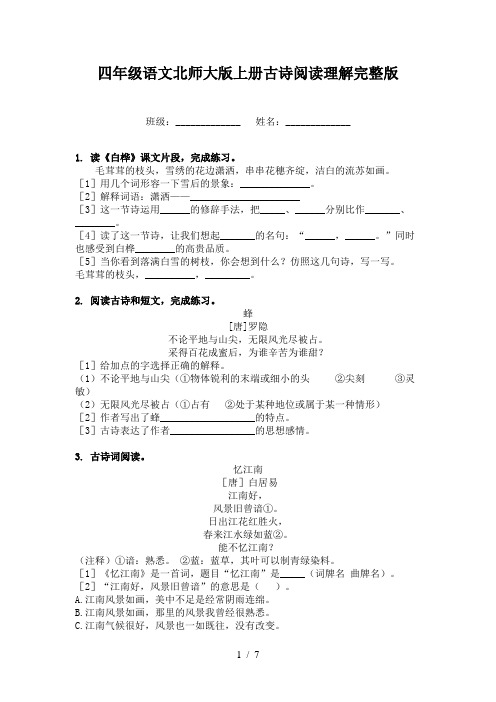
四年级语文北师大版上册古诗阅读理解完整版班级:_____________ 姓名:_____________1. 读《白桦》课文片段,完成练习。
毛茸茸的枝头,雪绣的花边潇洒,串串花穗齐绽,洁白的流苏如画。
[1]用几个词形容一下雪后的景象:______________。
[2]解释词语:潇洒——______________________[3]这一节诗运用______的修辞手法,把_____、______分别比作_______、________。
[4]读了这一节诗,让我们想起_______的名句:“______,______。
”同时也感受到白桦________的高贵品质。
[5]当你看到落满白雪的树枝,你会想到什么?仿照这几句诗,写一写。
毛茸茸的枝头,__________,_________。
2. 阅读古诗和短文,完成练习。
蜂[唐]罗隐不论平地与山尖,无限风光尽被占。
采得百花成蜜后,为谁辛苦为谁甜?[1]给加点的字选择正确的解释。
(1)不论平地与山尖(①物体锐利的末端或细小的头②尖刻③灵敏)(2)无限风光尽被占(①占有②处于某种地位或属于某一种情形)[2]作者写出了蜂___________________的特点。
[3]古诗表达了作者_________________的思想感情。
3. 古诗词阅读。
忆江南[唐]白居易江南好,风景旧曾谙①。
日出江花红胜火,春来江水绿如蓝②。
能不忆江南?(注释)①谙:熟悉。
②蓝:蓝草,其叶可以制青绿染料。
[1]《忆江南》是一首词,题目“忆江南”是_____(词牌名曲牌名)。
[2]“江南好,风景旧曾谙”的意思是()。
A.江南风景如画,美中不足是经常阴雨连绵。
B.江南风景如画,那里的风景我曾经很熟悉。
C.江南气候很好,风景也一如既往,没有改变。
D.江南风景优美,那些古朴的风景让人眷恋。
[3]词中的对仗句是:__________,__________。
[4]词中的“___”这句话点明了诗人对江南的留恋。
- 1、下载文档前请自行甄别文档内容的完整性,平台不提供额外的编辑、内容补充、找答案等附加服务。
- 2、"仅部分预览"的文档,不可在线预览部分如存在完整性等问题,可反馈申请退款(可完整预览的文档不适用该条件!)。
- 3、如文档侵犯您的权益,请联系客服反馈,我们会尽快为您处理(人工客服工作时间:9:00-18:30)。
船
----白桦
我有过多次这样的奇遇,从天堂到地狱只在瞬息之间;
每一朵可爱、温柔的浪花,
都成了突然崛起、随即倾倒的高山。
每一滴海水都变脸变色,
刚刚还是那样美丽、蔚蓝;
旋涡纠缠着旋涡,
我被抛向高空又投进深渊……
当时我甚至想到过轻生,
眼前一片苦海无边;
放弃了希望就象放弃了舵柄,
在暴力之下只能沉默和哀叹。
今天我才有资格嘲笑昨天的自己,为昨天落叶似的惶恐感到羞惭;
虚度了多少年华,
船身多次被礁石撞穿……
千万次在大洋里撒网,
才捕获到一点点生活的经验,
才恍然大悟,
啊!道理原是如此浅显:
你要航行吗?
必然会有千妖百怪出来阻拦;
暴虐的欺凌是它们的游戏,
制造灭亡是它们唯一的才干。
命中注定我要常常和它们相逢,因为我的名字叫做船;
面对强大于自身千万倍的对手,能援救自己的只有清醒和勇敢。
恐惧只能使自己盲目,
盲目只能夸大魔鬼的狰狞嘴脸;也许我的样子比它们更可怕,当我以生命相拼,一往无前!只要我还有一根完整的龙骨,绝不驶进避风的港湾;
把生命放在征途上,
让勇敢来决定道路的宽窄、长短。
我完完全全的自由了,
船头成为埋葬它们的铁铲;
我在波浪中有节奏地跳跃,
就象荡着一个巨大的秋千。
即使它们终于把我撕碎,
变成一些残破的木片;
我不会沉沦,决不!
我还会在浪尖上飞旋。
后来者还会在残片上认出我,
未来的诗人会喟然长叹:
“这里有一个幸福的灵魂,
它曾经是一艘前进着的航船……”
The Ship
Bai Hua
I have time after time experienced such an adventure:
From heaven to hell needs only a twinkling of eyes;
Each lovable and tender spray,
Becomes in an instant a high peak on the collapsing.
Each drop of seawater turns hostile and changes hue;
In spite of its blueness and loveliness a moment ago.
Vortices are entangling upon vortices;
I am heaved heavenward and flung into an abyss
When the idea of commiting suicide hits me,
Before my eyes is a vast expanse of bitter sea;
To abandon hope is like abandoning the tiller,
And one has to save one’s breath and bewail under violence. Only today I am entitled to mock the me myself of yore, And I am ashamed of the falling-leaf-like terror of yesterday;
How many years are fooled away,
And the hull of the ship is broken by the reef time and again Not until the net is cast for myriads of times in the ocean,
Do we capture a scantling of life experience,
And it dawns on us:
Oh! The reason behind is so simple and easy:
Do you intend to take a voyage?
Thousands of monsters are lying in wait to discourage;
Tyrannous bullying is their game,
And their sole ability is to bring destruction.
I am destined to come across them from time to time,
Because my name is ship;
Facing the antagonist who is thousands of times more powerful than
myself,
Only sobriety and bravery can save me.
Trepidation only renders a person blind,
And blindness only magnifies the ferocious features of the demons;
Perhaps my appearance is more frightful than them, When I go all out at the cost of my life, pressing forward!
So long as I have kept one intact keel,
I will never sail into a safe harbour;
I place my life on the journey,
And the width and length of the road will be determined by courage.
When I am completely free,
The prow becomes a shovel with which to bury them;
In the waves I am dancing rhythmically,
Like swaying a huge swing.
Even if they tear me up,
Into some broken pieces,
I will never sink into depravity, never!
I can also wheel on the spray.
The late comer can recognize me on the remains,
And the future poet will sigh a deep sigh:
“There is a happy soul here,
Which has ever been a ship on the sailing ”。
